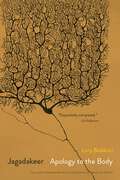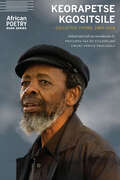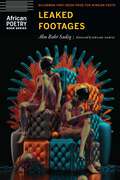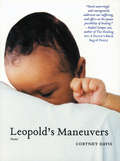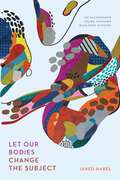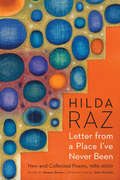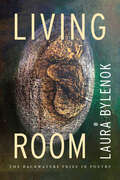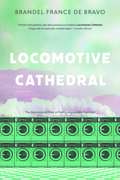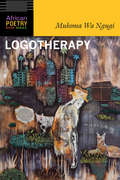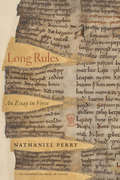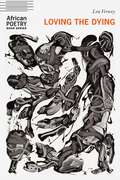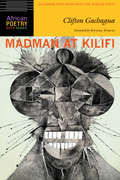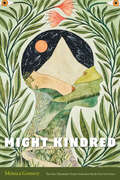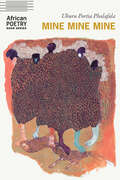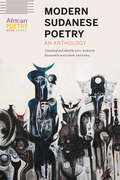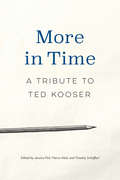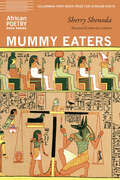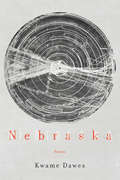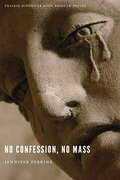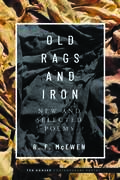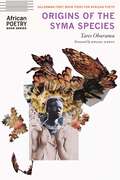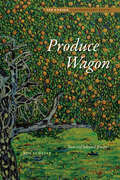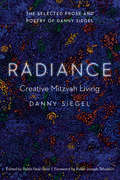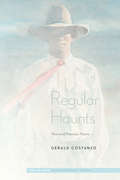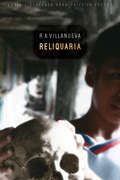- Table View
- List View
Jagadakeer: Apology To The Body (The Raz/Shumaker Prairie Schooner Book Prize in Poetry)
by Lory BedikianWinner of the Raz/Shumaker Prairie Schooner Book Prize in PoetryJagadakeer: Apology to the Body presents the voice of a daughter of immigrant parents, now gone, from Lebanon and Syria and of Armenian descent. In this five-part testimony Lory Bedikian reconstructs the father figure, mother figure, and the self. Using a sestina, syllabics, prose poems, and longer poetic sequences, Bedikian creates elegies for parents lost and self-elegiac lyrics and narratives for living with illness. Often interrupted with monologues and rants, the poems grapple with the disorder of loss and the body&’s failures. Ultimately, Bedikian contemplates the concept of fate, destiny (jagadakeer), and the excavation of memory—whether to question familial inheritance or claim medical diagnoses.
Keorapetse Kgositsile: Collected Poems, 1969–2018 (African Poetry Book)
by Keorapetse KgositsileKeorapetse Kgositsile, South Africa&’s second poet laureate, was a political activist, teacher, and poet. He lived, wrote, and taught in the United States for a significant part of his life and collaborated with many influential and highly regarded writers, including Gwendolyn Brooks, Sterling Plumpp, Dudley Randall, and George Kent. This comprehensive collection of Kgositsile&’s new and collected works spans almost fifty years. During his lifetime, Kgositsile dedicated the majority of his poems to people or movements, documenting the struggle against racism, Western imperialism, and racial capitalism, and celebrating human creativity, particularly music, as an inherent and essential aspect of the global liberation struggle. This collection demonstrates the commitment to equality, justice, and egalitarianism fostered by cultural workers within the mass liberation movement. As the introduction notes, Kgositsile had an &“undisputed ability to honor the truth in all its complexity, with a musicality that draws on the repository of memory and history, rebuilt through the rhythms and cadences of jazz.&” Addressing themes of Black solidarity, displacement, and anticolonialism, Kgositsile&’s prose is fiery, witty, and filled with conviction. This collection showcases a voice that wanted to change the world—and did.
Leaked Footages (African Poetry Book)
by Abu Bakr SadiqWinner of the Sillerman First Book Prize for African Poets The poems in Leaked Footages carry urgent subjects, ranging from death to disappearance to grief to memory. Not only do the poems fulfill the tradition of witnessing often manifested in contemporary poets such as Garous Abdolmalekian and Ilya Kaminsky, but they extend that tradition by the medium through which they witness: the technical and the technological. Here, the camera, the closed-circuit TV, cinematographic techniques, and the cyborg are trusted for truth telling. Reality is represented in footage seen through the eyes of multifaceted speakers. In Abu Bakr Sadiq&’s exploration of northern Nigeria in speculative poetry, the lyrical meets the chronicle. In this fusion of Afrofuturism with experimental poetic techniques, the reader witnesses a country ravaged by terrorism and the consequences of war, as well as the effects of these on those who survive. While the tone is grave with concern and conscience, the poems do not take the easy route of sentiment. Instead, attention is paid to structure—from the erasure poems that are informed by the theme of disappearance to the contrapuntal poems that are influenced by the testaments of leaving.
Leopold's Maneuvers (Prairie Schooner Book Prize in Poetry)
by Cortney DavisIn the venerable tradition of caregivers writing about the healing arts—a tradition peopled by the likes of Anton Chekhov, Walt Whitman, William Carlos Williams, Walker Percy, and Denise Levertov—Cortney Davis brings to poetry the experience, insight, and compassion of a nurse practitioner who daily confronts the unexpected frailties, passions, and power of the flesh. Taking the body as her text, Davis crafts her poetry from the pains of labor and the joys of birth, the depredations of disease and the sustaining hope of recovery. She trains her clear, unflinching gaze on the unfolding scene—a woman shipwrecked with a stranger; an adult reinventing childhood; an ill woman rediscovering pleasure in her body; a nurse realizing, in one harrowing instant, that she is as vulnerable as her patients—unerringly finding the particular image, the human detail, that connects reader, writer, and subject with the world. Primal, compelling, intelligent, these poems show us how to see as clearly as the poet does, with empathy and grace.
Let Our Bodies Change the Subject (The Raz/Shumaker Prairie Schooner Book Prize in Poetry)
by Jared HarélLet Our Bodies Change the Subject is a poetry collection that dives headlong into the terrifying, wondrous, sleep-deprived existence of being a parent in twenty-first-century America. In clear, dynamic verses that disarm then strike, Jared Harél investigates our days through the keyhole of domesticity, through personal lyrics and cultural reckonings. Whether taking a family trip to Coney Island or simply showing his son snowflakes on Inauguration morning, Harél guides us toward moments of intimacy and understanding, humor and grief. &“I will try,&” he admits, &“to be better than myself, which is all/I&’ve ever wanted and everything I need.&” Winner of the Raz/Shumaker Prairie Schooner Book Prize in Poetry, Let Our Bodies Change the Subject is a secular prayer. Hoping against hope, Harél works to reconcile feelings of luck and loss, of living for joy while fearing the worst.
Letter from a Place I've Never Been: New and Collected Poems, 1986-2020
by Hilda RazHilda Raz has an ability &“to tell something every day and make it tough,&” says John Kinsella in his introduction. Letter from a Place I&’ve Never Been shows readers the evolution of a powerful poet who is also one of the foremost literary editors in the country. Bringing together all seven of her poetry collections, a long out-of-print early chapbook, and her newest work, this collection delights readers with its empathetic and incisive look at the inner and outer lives we lead and the complexities that come with being human. Showcasing the work of a great American voice, Letter from a Place I&’ve Never Been at last allows us to see the full scope and range of Raz&’s work.
Living Room (The Backwaters Prize in Poetry)
by Laura BylenokDeeply phenomenological and ecological, Laura Bylenok&’s poems in Living Room imagine the lived reality of other organisms and kinds of life, including animals, plants, bacteria, buildings, and rocks. They explore the permeability of human and nonhuman experience, intelligence, language, and subjectivity. In particular, the poems consider so-called model organisms—nonhuman species studied to understand specific and often human biological processes, diseases, and phenomena—as well as an experience of self and world that cannot be objectively quantified. The impulse of these poems is to slow down, to see and feel, and to listen closely. Language becomes solid, palpable as fruit. Long lines propel breath and push past the lung&’s capacity. Life at a cellular level, synthesis and symbiosis, is revealed through forests, fairy tales, and vines that grow over abandoned houses and hospital rooms. A living room is considered as a room that is lived in and also a room that is alive. Cells are living rooms. A self is a room that shares walls with others. Interconnection and interplay are thematic, and the network of poems becomes a linguistic rendering of a heterogeneous and nonhierarchical ecosystem, using the language of biology, genetics, and neurochemistry alongside fairy tale and dream to explore the interior spaces of grief, motherhood, mortality, and self.
Locomotive Cathedral (The Backwaters Prize in Poetry Honorable Mention)
by Brandel France de BravoWith wit and vulnerability, Brandel France de Bravo explores resilience in the face of climate change and a global pandemic, race, and the concept of a self, all while celebrating the power of breath as &“baptism on repeat.&” Whether her inspiration is twelfth-century Buddhist mind-training slogans or the one-footed crow who visits her daily, France de Bravo mines the tension between the human desire for permanence and control, and life&’s fluid, ungraspable nature. Poem by poem, essay by essay, she builds a temple to the perpetual motion of transformation, the wondrous churn of change and exchange that defines companionship, marriage, and ceding our place on Earth: &“not dying, but molting.&”
Logotherapy (African Poetry Book)
by Mukoma Wa NgugiWritten as a tribute to family, place, and bodily awareness, Mukoma Wa Ngugi’s poems speak of love, war, violence, language, immigration, and exile. From a baby girl’s penchant for her parents’ keys to a warrior’s hunt for words, Wa Ngugi’s poems move back and forth between the personal and the political. In the frozen tundra of Wisconsin, the biting winds of Boston, and the heat of Nairobi, Wa Ngugi is always mindful of his physical experience of the environment. Ultimately it is among multiple homes, nations, and identities that he finds an uneasy peace.
Long Rules: An Essay in Verse (The Backwaters Prize in Poetry)
by Nathaniel PerryA book-length poem in six sections, Long Rules takes readers to five Trappist monasteries in the southeastern United States to consider the intersections of solitude, family, music, and landscape. Its lines unspool in a loose and echoing blank verse that investigates monastic rules, sunlight, Saint Basil, turnips, Thomas Merton, saddle-backed caterpillars, John Prine, fatherhood, and everything in between. Looking inside and outside the self, Perry asks, what, or whom, are we serving? Winner of the Backwaters Prize in Poetry, this essay in verse contemplates the meaning of solitude and its contemporary ramifications in a time of uncertainty.
Loving the Dying (African Poetry Book)
by Len VerweyLoving the Dying is a collection of poems on life&’s different stages. Set against the backdrop of a conflicted society, Len Verwey looks at a person&’s life from youth and growing up to aging and dying, considering what the ineluctable reality of death might imply about how we should think about our lives. These are poems of uncertainty rather than certainty. The more overtly biographical ones end with as many questions as they start with, and there is often sympathy for the outsider or the marginalized voice. Varying in tone and complexity, Verwey&’s poems focus on the tension between escapism and reality, truth and delusion (for individuals and societies), and the need to face death if we are to care for the aged and learn to understand the process of dying. As in his first poetry collection, In a Language That You Know, Verwey continues his effort to understand the successes and failures of the South African post-apartheid journey, with both humor and some despair.
Madman at Kilifi (African Poetry Book)
by Clifton GachaguaClifton Gachagua’s collection Madman at Kilifi, winner of the Sillerman First Book Prize for African Poets, concerns itself with the immediacy of cultures in flux, cybercommunication and the language of consumerism, polyglot politics and intrigue, sexual ambivalence and studied whimsy, and the mind of a sensitive, intelligent, and curious poet who stands in the midst of it all. Gachagua’s is a world fully grounded in the postmodern Kenyan cultural cauldron, a world in which people speak with “satellite mouths,” with bodies that are “singing machines,” and in which the most we can do is “collide against each other.” Here light is graceful, and we glow like undiscovered galaxies and shifting matter. And here as well, we find new expression in a poetry that moves as we do.
Might Kindred (The Raz/Shumaker Prairie Schooner Book Prize in Poetry)
by Mónica GomeryThe poems of Might Kindred wonder aloud: can we belong to one another, and &“can a people belong to a dreaming machine?&” Conjuring mountains and bodies of water, queer and immigrant poetics, beloveds both human and animal, Mónica Gomery explores the intimately personal and the possibility of a collective voice. Here anthems are sung and fall apart midsong. The speaker exchanges letters with her ancestors, is visited by a shadow sister, and interrogates what it means to make a home as a first-generation American. Winner of the Raz/Shumaker Prairie Schooner Book Prize in Poetry, the poems in Might Kindred are rooted in the body and its cousins, seeking the possibility of kinship, &“in case we might kindness, might ardor together.&” Belonging and unbelonging are claimed as part of the same complicated whole, and Gomery&’s intersections reach for something divine at the center.
Mine Mine Mine (African Poetry Book)
by Uhuru Portia PhalafalaMine Mine Mine is a personal narration of Uhuru Portia Phalafala&’s family&’s experience of the migrant labor system brought on by the gold mining industry in Johannesburg, South Africa. Using geopoetics to map geopolitics, Phalafala follows the death of her grandfather during a historic juncture in 2018, when a silicosis class action lawsuit against the mining industry in South Africa was settled in favor of the miners. Phalafala ties the catastrophic effects of gold mining on the miners and the environment in Johannesburg to the destruction of Black lives, the institution of the Black family, and Black sociality. Her epic poem addresses racial capitalism, bringing together histories of the transatlantic and trans-Indian slave trades, of plantation economies, and of mining and prison-industrial complexes. As inheritor of the migrant labor lineage, she uses her experience to explore how Black women carry intergenerational trauma of racial capitalism in their bodies and intersects the personal and national, continental and diasporic narration of this history within a critical race framework.
Modern Sudanese Poetry: An Anthology (African Poetry Book)
by Adil BabikirSpanning more than six decades of Sudan’s post-independence history, this collection features work by some of Sudan’s most renowned modern poets, largely unknown in the United States. Adil Babikir’s extensive introduction provides a conceptual framework to help the English reader understand the cultural context. Translated from Arabic, the collection addresses a wide range of themes—identity, love, politics, Sufism, patriotism, war, and philosophy—capturing the evolution of Sudan’s modern history and cultural intersections.Modern Sudanese Poetry features voices as diverse as the country’s ethnic, cultural, and natural composition. By bringing these voices together, Babikir provides a glimpse of Sudan’s poetry scene as well as the country’s modern history and post-independence trajectory.
More in Time: A Tribute to Ted Kooser
by Timothy Schaffert Marco Abel Jessica PoliMore in Time is a celebration and tribute to Ted Kooser, two-time U.S. Poet Laureate, winner of the Pulitzer Prize for Poetry, and Presidential Professor of the University of Nebraska. Through personal reflections, essays, and creative works both inspired by and dedicated to Kooser, this collection shines a light on the many ways the midwestern poet has affected others as a teacher, mentor, colleague, and friend, as well as a fellow writer and observer-of-the-world. The creative responses included in this volume are reflective of the impact Kooser has had in his connections to other writers, while also revealing glimpses of his distinct way of seeing.
Mummy Eaters (African Poetry Book)
by Sherry ShenodaWinner of the Sillerman First Book Prize for African Poets, Sherry Shenoda&’s collection Mummy Eaters follows in the footsteps of an imagined ancestor, one of the daughters of the house of Akhenaten in the Eighteenth Dynasty, Egypt. Shenoda forges an imagined path through her ancestor&’s mummification and journey to the afterlife. Parallel to this exploration run the implications of colonialism on her passage. The mythology of the ancient Egyptians was oriented toward resurrection through the preservation of the human body in mummification. Shenoda juxtaposes this reverence for the human body as sacred matter and a pathway to eternal life with the sixteenth- and seventeenth-century European fascination with ingesting Egyptian human remains as medicine and using exhumed Egyptian mummies as paper, paint, and fertilizer. Today Egyptian human remains are displayed in museums. Much of Mummy Eaters is written as a call and response, in the Coptic tradition, between the imagined ancestor and the author as descendant.
Nebraska: Poems
by Kwame DawesKwame Dawes is not a native Nebraskan. Born in Ghana, he later moved to Jamaica, where he spent most of his childhood and early adulthood. In 1992 he relocated to the United States and eventually found himself an American living in Lincoln, Nebraska. In Nebraska, this beautiful and evocative collection of poems, Dawes explores a theme constant in his work—the intersection of memory, home, and artistic invention. The poems, set against the backdrop of Nebraska’s discrete cycle of seasons, are meditative even as they search for a sense of place in a new landscape. While he shovels snow or walks in the bitter cold to his car, he is engulfed with memories of Kingston, yet when he travels, he finds himself longing for the open space of the plains and the first snowfall. With a strong sense of place and haunting memories, Dawes grapples with life in Nebraska as a transplant.
No Confession, No Mass (Prairie Schooner Book Prize in Poetry)
by Jennifer PerrineWhether exploring the porous borders between sin and virtue or examining the lives of saints and mystics to find the human experiences in stories of the divine, the poems in No Confession, No Mass move toward restoration and reunion.Jennifer Perrine’s poems ask what healing might be possible in the face of sexual and gendered violence worldwide—in New Delhi, in Steubenville, in Juárez, and in neighborhoods and homes never named in the news. The book reflects on our own complicity in violence, “not confessing, but unearthing” former selves who were brutal and brutalized—and treating them with compassion. As the poems work through these seeming paradoxes, they also find joy, celebrating transformations and second chances, whether after the failure of a marriage, the return of a reluctant soldier from war, or the everyday passage of time.Through the play of language in received forms—abecedarian, sonnet, ballad, ghazal, villanelle, ballade—and in free verse buzzing with assonance, alliteration, and rhyme, these poems sing their resistance to violence in all its forms.
Old Rags and Iron: New and Selected Poems (Ted Kooser Contemporary Poetry)
by R. F. McEwenOld Rags and Iron is a collection of narrative poems about the life experiences of working-class people with whom the author, R. F. McEwen, is not only acquainted but whose lives he has shared. McEwen supplemented his income as a teacher while working as a professional logger and tree trimmer, and he writes with great love and respect for blue-collar families. Set primarily in the back-of-the-yard neighborhood of South Side Chicago, where McEwen grew up, as well as Pine Ridge, South Dakota, western Nebraska, Ireland, and elsewhere, the poems celebrate many voices and stories. Utilizing tree-trimming as a central metaphor, these poems of blank verse fictions reverberate like truth.
Origins of the Syma Species (African Poetry Book)
by Tares OburumuWinner of the Sillerman First Book Prize for African Poets Winner of the Sillerman First Book Prize for African Poets, Tares Oburumu&’s collection is a brief history of where he came from: Syma, a neglected oil-producing region of Nigeria. After growing up with a single mother in the creek- and brook-marked region, and himself now a single parent, Oburumu examines single parenthood and how love defines family circles. Mixing music, religion, and political critique, Origins of the Syma Species evokes pasts and futures. Inspired by the relative chaos found in the origin of things, Oburumu&’s poems explore how the beauty of chaos binds us to our ancestral roots. In his poems Oburumu identifies with anyone who is a single parent or is dealing with the lonely trauma of a broken home. His poems instill hopefulness in a world that has the means to throw many into poverty and agony.
Produce Wagon: New and Selected Poems (Ted Kooser Contemporary Poetry)
by Roy ScheeleThe poems in Produce Wagon explore the vast and varied circumstances of the human experience. Roy Scheele delves into his love for his wife in &“Remembrances,&” the opening poem from his first chapbook, and &“Driving after Dark&”; his fascination with the natural world in poems such as &“How the Fox Got Away&” and &“Late Autumn Woods&”; his appreciation of his family in &“A Kitchen Memory&” and &“The Long Rise&”; and his fondness for stories in &“The Carny Circuit&” and &“In the Clear.&” In these and the other poems in the collection, Scheele uses a variety of traditional verse forms as well as free verse and syllabics, carefully fitting the form of each poem to his subject matter. Though most of the poems are set in Nebraska and neighboring states, there is a universality to the subjects Scheele addresses. In these poems anywhere is everywhere.
Radiance: Creative Mitzvah Living
by Danny SiegelThe Selected Prose and Poetry of Danny Siegel This first anthology of the most important writings by Danny Siegel, spanning and renewing fifty years of his insights intersperses soulful Jewish texts with innovative Mitzvah ideas to rouse individuals and communities to transform our lives, communities, neighborhoods, and world. As a renowned teacher Siegel describes the creative—often startling—ways individuals from different walks of life have brought compassion into the world, recognizes them as Mitzvah heroes, and suggests how we can apply their life lessons. He also plumbs how giving enriches living and presents Jewishly informed best principles for doing more world repair (Tikkun Olam). As a scholar of rabbinic literature Siegel offers translations and commentaries on Jewish texts illuminating Tzedakah, values, caring, and leadership. In addition he tops off a half-century of his thought with five new essays reflecting on his visions for a better world. The selected poetry asks religious and theological questions in the face of oppression and war, gives voice to personal moments often neglected by ritual, and exults at the wonders of modern Israel and the revelation of love. Both inspirational and pragmatic, this anthology offers practical guidance on using Siegel&’s classic and novel works in personal living and in Jewish organizational settings. Ultimately, in exploring the dynamic interaction between heroes, texts, and ourselves, Siegel seeks to engage each of us in discovering our own radiant potential for creative Mitzvah living.
Regular Haunts: New and Previous Poems (Ted Kooser Contemporary Poetry)
by Ted Kooser Gerald CostanzoGerald Costanzo, long known as one of the best contemporary poets of satire, focuses specifically on American themes that, though presented as parables, fables, jokes, and put-ons, remain darkly serious in tone. His subject is the mythic landscape of America itself: the transitory, popular, consumer culture of late twentieth- and early twenty-first-century life. Costanzo evokes a sense of having arrived on the scene too late, of having missed the heyday of American innocence and possibility, and now—in the present—is forced to live with diminished experience. He mourns a culture where genuine emotion cannot be found but where its semblance can be endlessly marketed. Regular Haunts is a retrospective collection of Costanzo’s work that also includes nearly thirty new poems.
Reliquaria (Prairie Schooner Book Prize in Poetry)
by R. A. VillanuevaIn his prize-winning poetry collection Reliquaria, R. A. Villanueva embraces liminal, in-between spaces in considering an ever-evolving Filipino American identity. Languages and cultures collide; mythologies and faiths echo and resound. Part haunting, part prayer, part prophecy, these poems resonate with the voices of the dead and those who remember them. In this remarkable book, we enter the vessel of memory, the vessel of the body. The dead act as witness, the living as chimera, and we learn that whatever the state of the body, this much rings true: every ode is an elegy; each elegy is always an ode.
